Samsung SSD XP941 Review: The PCIe Era Is Here
by Kristian Vättö on May 15, 2014 12:00 PM ESTRandom Read/Write Speed
The four corners of SSD performance are as follows: random read, random write, sequential read and sequential write speed. Random accesses are generally small in size, while sequential accesses tend to be larger and thus we have the four Iometer tests we use in all of our reviews.
Our first test writes 4KB in a completely random pattern over an 8GB space of the drive to simulate the sort of random access that you'd see on an OS drive (even this is more stressful than a normal desktop user would see). We perform three concurrent IOs and run the test for 3 minutes. The results reported are in average MB/s over the entire time.
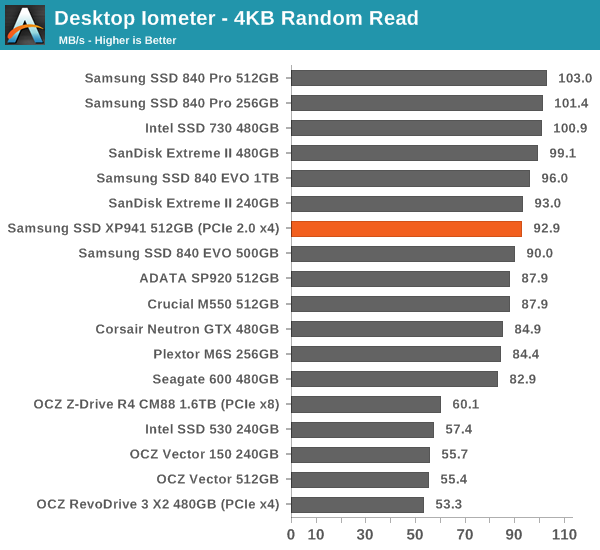
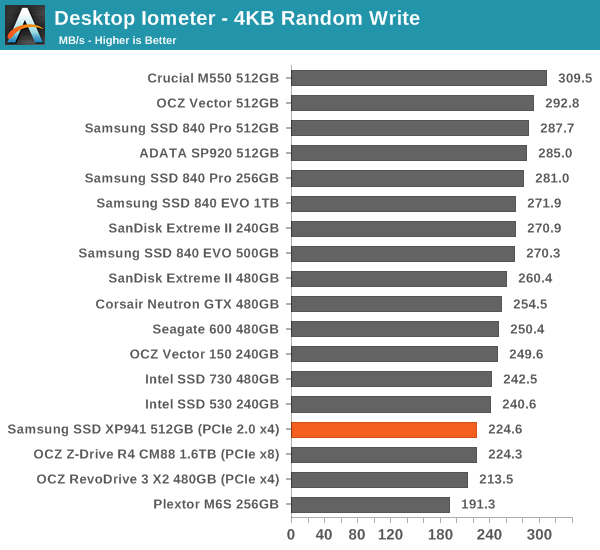
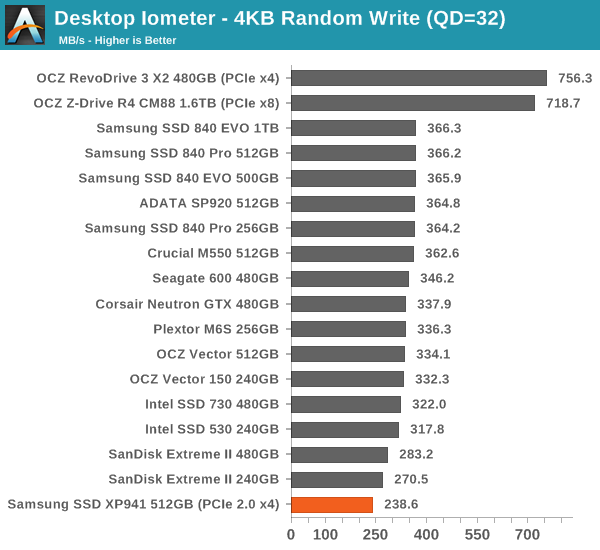
The random performance of XP941 doesn't stand out. Especially random write speeds are quite low by today's standards and queue depth scaling is close to non-existent. That said, I don't believe that high queue depth performance is really important for client workloads as our internal workload analysis shows that even under heavy use the average queue depth tends to be no more than 5. Our Storage Benches also show that even though the random performance isn't excellent, the strong sequential performance thanks to the faster PCIe interface makes up for the difference.
Sequential Read/Write Speed
To measure sequential performance we run a 1 minute long 128KB sequential test over the entire span of the drive at a queue depth of 1. The results reported are in average MB/s over the entire test length.
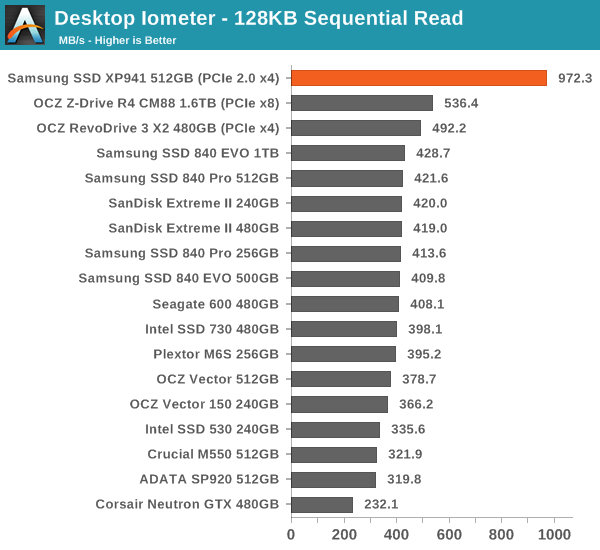
The sequential speeds are the highest we have ever tested in a consumer SSD. Even the 8-controller Z-Drive R4 behemoth can't beat the XP941, which really speaks for the efficiency of a single controller design. If you were to increase the queue depth, the Z-Drive would easily beat the XP941 since higher queue depth would increase parallelism and the Z-Drive could take advantage of all of its eight controllers. However, I was able to reach speeds of up to 1560MB/s with the XP941 at queue depth of 32, which is pretty much as fast as you can go with PCIe 2.0 x4 without tweaking any settings (the PCIe bus can be overclocked to achieve even higher speeds, though there can be a negative impact on random performance. We will investigate this at a later date).
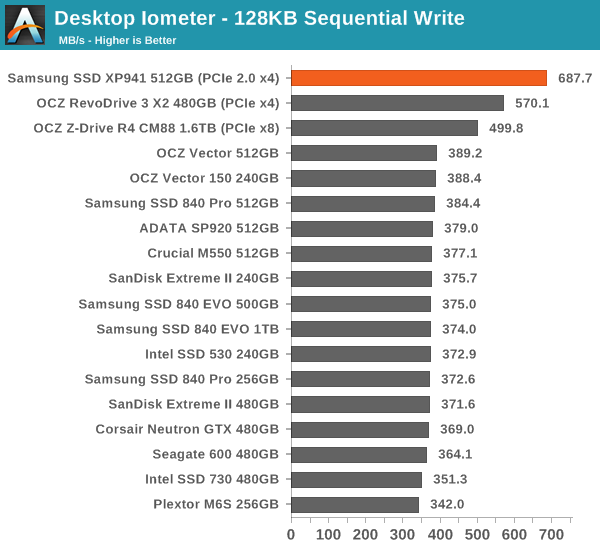
AS-SSD Incompressible Sequential Read/Write Performance
The AS-SSD sequential benchmark uses incompressible data for all of its transfers. The result is a pretty big reduction in sequential write speed on SandForce based controllers. The XP941 does brilliantly in AS-SSD as well but now the strength of eight controllers starts to show for the Z-Drive. Even then, the XP941 is still about twice as fast as the fastest SATA 6Gbps SSD.
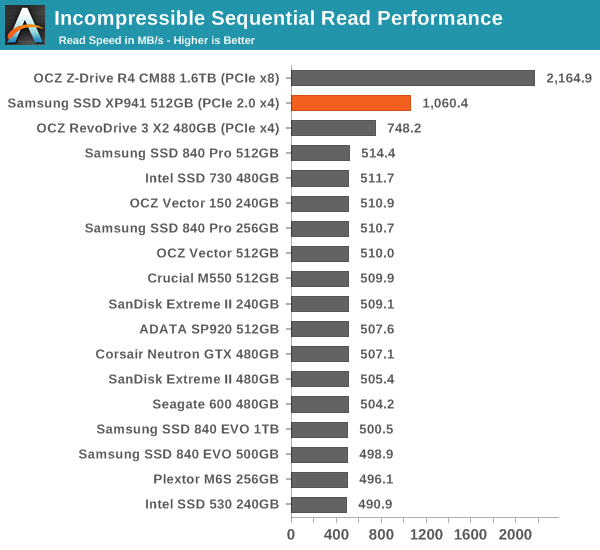
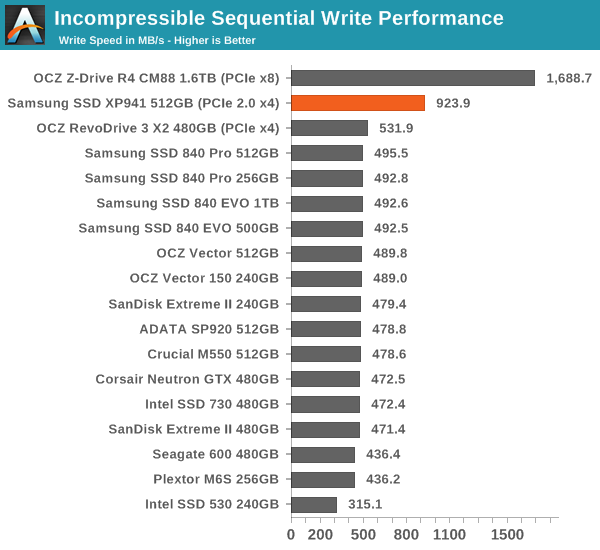










110 Comments
View All Comments
nathanddrews - Thursday, May 15, 2014 - link
They weren't trying to squelch his speech or impugn his rights, rather give him advice as to where he could take those opinions so they would be better appreciated. "Free speech" isn't some magical phrase that suddenly allows you to say whatever you want whenever and wherever you want. Valuing free speech doesn't mean you have to value dumb comments on websites, even this comment that I just made! :-PBabar Javied - Thursday, May 15, 2014 - link
This site needs a "thumbs up" or "like" button because I'd like to "like" your comment good sir.Sabresiberian - Thursday, May 15, 2014 - link
Hmm yeah it's a matter of etiquette, not "free speech". Those topics tend to derail discussions, turn them into heated arguments which add nothing to a discussion unless they are pertinent. It is bad internet manners to bring them up in any form when the topic has nothing to do with them.As far as not reading the post - well. that would make sense in an ongoing discussion, where it could easily be seen that the comments were not going to be interesting to the reader before he had read them. This kind of post though - it is impossible to know the poster will go too far for you until he has. :)
yaedon - Thursday, May 15, 2014 - link
@critical: I would love to go on a long and well-thought-out diatribe on common misconceptions of the First Amendment in response to your comment, but the comment section of a tech blog is simply not the appropriate place for that and would continue to distract me, you, and everyone who reads the comment from our common interest in computer tech. I fail to understand how entreating someone to observe good manners so that all people can enjoy this fine tech blog is inflammatory.Travisryno - Thursday, October 18, 2018 - link
..has nothing to do with free speech-private citizens/private forum.This is about respect-specifically not bringing heated/emotional topics into a professional and/or h.obbyist's forum.
Hell I could say you are imposing on their right to tell people to leave that stuff at the door.. but i'd just be abusing it too
vFunct - Thursday, May 15, 2014 - link
lol he totally didn't know that businesses have fixed costs and not just variable costs.vgray35@hotmail.com - Friday, May 16, 2014 - link
Well I do not concur. Both the PCIe and SATA interfaces are not new by any means. And as for the SSD technology, well that too is not new. The development costs are much lower that one would think. Pretty much a new PCB with layout testing. That's it. It's just old tech on a new PCB, since SSD on PCIe has also been around quite a while now too.Opportunistic behavior dictates price first and foremost, and I do not believe the device is peppered with Samsung blessed gold which could justify such an expensive PCB.
nafhan - Thursday, May 15, 2014 - link
In general:Price = cost where they will sell the number of units that maximizes profits.
If they priced it lower, they'd be doing that out of greed, too.
MrSpadge - Thursday, May 15, 2014 - link
"If they priced it lower, they'd be doing that out of greed, too."Brilliant!
RobElk - Thursday, May 15, 2014 - link
This uses multiple controllers to reach that speed, so it is means more parts, not less.